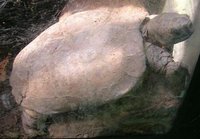Endangered Asian turtle born in Atlanda Zoo

A rare Arakan forest turtle was hatched in Zoo Atlanta. This is a great victory for the researchers trying to save the endangered species.
The week-old turtle is the fourth of the brown-and-tan spotted reptiles born there in the last six years, zoo officials said Tuesday. Two of the hatchlings have died.
The zoo is the only facility in the world successfully breeding the turtle, which is one of the planet's most critically endangered species and native to the Arakan hills of western Myanmar. They were believed to be extinct for close to a century, but the turtles appeared in Asian food markets in the mid-1990s.
Another baby could be on the way as zoo keepers wait to see if another egg will hatch.
Scientists blame the rapid disappearance of the Arakan forest turtle - much like other shelled reptiles _ on their popularity in Asia for cooking and medicinal purposes.
"For a species this close to extinction, it is simply not acceptable that they are being eaten," said Joseph Mendelson, curator of herpetology at the zoo.
Captive breeding programs don't "solve the problem of them being overharvested in the wild. It does make sure they don't go extinct while we work to solve that problem," Mendelson said.
The turtle has an abysmal survival rate. Hatchlings often die both in captivity and the wild, and food traders are plundering the population of adult turtles that could keep the species going.
The turtles are very delicate and mate only once a year.
"The animals seem to be extremely difficult to establish in captivity," said Peter Paul van Dijk, director of the tortoise and freshwater turtle program for Conservation International.
The eggs take a 100 days to hatch. The zoo has had the pair of mating turtles since 2001 when the Turtle Survival Alliance bought them from a Chinese food market.
Though conservationists prefer to preserve endangered animals within their natural habitats, captive breeding programs act as "as insurance policies," particularly with the demand for turtles in Asia, van Dijk said.
"It's really a tragedy to lose a species that took millions of years to evolve," he said. "It's irreplaceable."
There are only 12 of the turtles living in captivity in the United States - at Zoo Atlanta, the St. Louis Zoo, the Miami Metro Zoo and River Banks Zoo and Garden in Columbia, South Carolina.
Subscribe to Pravda.Ru Telegram channel, Facebook, RSS!




